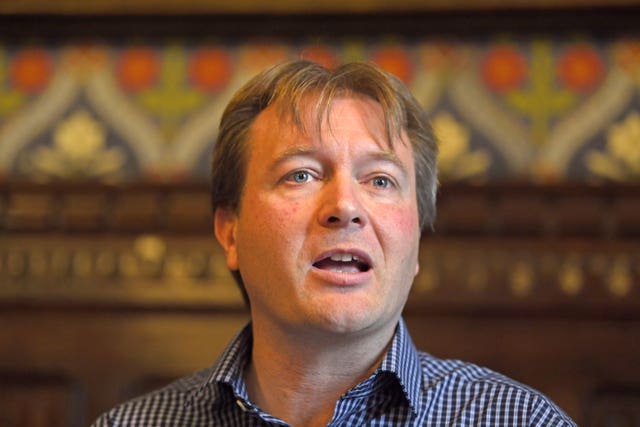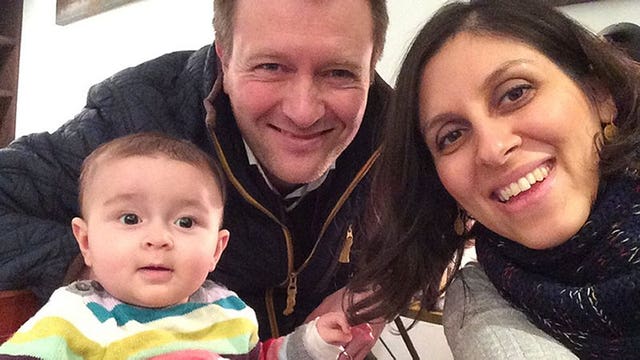
Boris Johnson is to meet Nazanin Zaghari-Ratcliffe’s husband to discuss efforts to secure the release of the British-Iranian mother imprisoned in Tehran.
Richard Ratcliffe will speak to the Prime Minister in Downing Street on Thursday as he re-doubles the pressure to free his wife, who has been detained since 2016.
Any optimism over Ms Zaghari-Ratcliffe’s chances of freedom has been dampened by the soaring tensions with Iran provoked by the US killing of its top general, Qassem Soleimani.
Mr Ratcliffe is expected to ask Mr Johnson – who he has previously criticised over his handling of the charity worker’s situation – to take a personal interest in the case and treat it as “a priority”.
Ahead of the meeting, Mr Ratcliffe called on the PM to take responsibility after comments he made when he was foreign secretary were blamed for worsening his wife’s plight.
Mr Ratcliffe told BBC Radio 4’s Today programme: “He needs to take responsibility for Nazanin’s case, for upholding the promise he made to us to leave no stone unturned.”
He urged Mr Johnson to be “brave” in resolving a long-running trade dispute with Iran over the settlement of a £400 million debt.
He added: “Nazanin was told way back in 2016 she was being held over it. It has long been in the shadows of our case.
“His (Mr Johnson’s) obligation is to protect British citizens. He needs to be brave in doing positive gestures in relation to the debt and other issues that will calm relations down, but also being brave in calling out Iran on hostage-taking. It is not an acceptable way to conduct diplomacy.”

Ms Zaghari-Ratcliffe, a 41-year-old mother from London, is serving a five-year sentence after being arrested during a holiday with her daughter and accused of spying.
Her family and the UK Government have always maintained her innocence and she has been given diplomatic protection by the Foreign Office.
Diplomatic protection is a little-used mechanism the Government can use to attempt to help individuals it believes have been wronged by another state.
It raises Ms Zaghari-Ratcliffe’s treatment by Iran to become a formal state issue and recognises that the legal proceedings brought against her failed to meet international standards.
Mr Johnson has been persistently criticised for wrongly claiming, when he was foreign secretary, that she was training journalists at the time of her arrest.
Four days later she was summoned to an unscheduled court hearing during which Mr Johnson’s comments were cited as proof she was engaged in “propaganda against the regime”.
Ms Zaghari-Ratcliffe is among as many as five people with dual British-Iranian nationality, or with UK connections, believed to be in prison in Iran.
There are some hopes that diplomatic tensions could ease between London and Tehran if a long-running £400 million dispute is settled in the Court of Appeal this week.

Iran’s ambassador to the UK, Hamid Baeidinejad, tweeted that if a portion of the debt is assigned to Tehran then it will mean “the legal process of the case is coming to an end and there will be no excuse for default” from the Government.
The sum has been outstanding since pre-revolutionary Iran paid the UK for 1,500 Chieftain tanks in the 1970s.
The deal was cancelled after the Shah of Iran was deposed in 1979, but Britain has refused to heed Iran’s demands to hand back the money.
Ms Zaghari-Ratcliffe’s local MP, Labour’s Tulip Siddiq, called on the Government to pay the sum back to Iran so that her constituent can be returned to the UK and reunited with her family.
Ms Siddiq said in the Commons: “This case relates to the £400 million that we owe Iran as a country, and anyone with a passing interest in my constituent’s case will know that the debt is linked to her imprisonment.
“The Leader of the House (Jacob Rees-Mogg) said that the behaviour of the Iranian government is unforgivable, and I agree with him, but the behaviour of our Government is also unforgivable because we have not paid the money that we owe them.”
Mr Rees-Mogg said the issue is “extraordinarily difficult”.
He said: “The British Government cannot and must not pay or appear to pay, either in fact or reality, money to allow people who have been illegally detained to be released.
“The risk that would cause to other Britons travelling abroad would be very considerable.
“The law must take its course in relation to the money which was deposited here, but it would be absolutely wrong to connect the two issues.”


Comments: Our rules
We want our comments to be a lively and valuable part of our community - a place where readers can debate and engage with the most important local issues. The ability to comment on our stories is a privilege, not a right, however, and that privilege may be withdrawn if it is abused or misused.
Please report any comments that break our rules.
Read the rules here